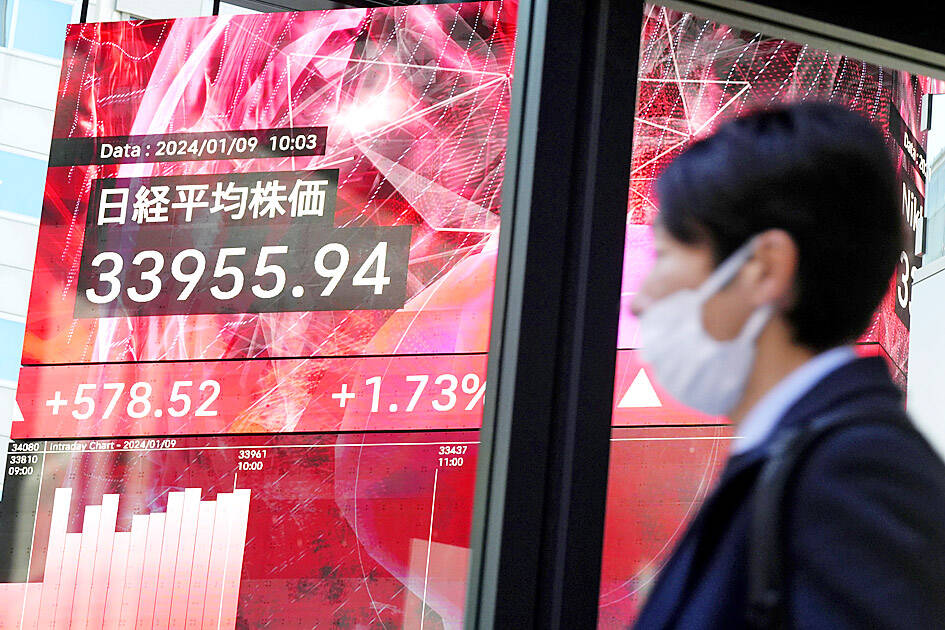Japan’s Nikkei 225 Stock Average yesterday climbed to its highest since the nation’s bubble economy era more than three decades ago, reflecting investor optimism that growth is returning after the country’s long battle with deflation.
The blue-chip gauge rose 1.2 percent to close at 33,763.18 in Tokyo, a level unseen since March 1990, lifted by a rebound in technology shares and a drop in Treasury yields. The benchmark TOPIX, which some funds prefer to follow because it is more comprehensive, gained 0.8 percent.
Both the Nikkei 225 and TOPIX completed an annual advance of more than 25 percent last year, their best performance in a decade. The measures were among the world’s biggest gainers last year as authorities pushed companies to improve shareholder value, while decades-long deflation faded and was replaced by mild price gains.

Photo: AP
A yen rate that remains weak historically despite a recent rebound has supported exporters, and optimism after Warren Buffett parked more of his cash in Japan’s biggest trading companies has also boosted equities in the world’s third-largest economy.
“Japanese stocks have been cheap for a long time,” and signs of corporate governance reforms and Buffett’s investments mean the Nikkei’s return to a three-decade high was not that surprising, Sumitomo Mitsui Trust Bank Ltd strategist Ayako Sera said.
“It’s important to watch if the Nikkei can reach a record high now,” she said. “The 40,000 yen level still seems quite far away.
Elsewhere in Asia, there were also gains in Bangkok, Manila, Mumbai, Shanghai, Singapore, Sydney and Wellington.
The advances came as traders try to ascertain the US Federal Reserve’s plans for interest rates this year, with focus firmly on the release this week of key inflation data.
The outlook was given a boost by a plunge in oil prices — a key driver of inflation — on Monday after Saudi Arabian Oil Co announced a cut of US$2 a barrel as it looks to regain lost market share, a move that fanned concerns that supply was far outstripping demand, particularly with China’s economy still struggling.
Equities in Hong Kong ended 0.21 percent down as traders failed to maintain early strong momentum, while Seoul shed 0.3 percent.
In Taipei, the TAIEX dipped 0.21 percent to close at 17,535.49 points, failing to sustain its earlier gains and falling below the 20-day moving average of 17,646 points, as it did on Monday.
“Before the presidential vote, which remains tense, many investors preferred to take advantage of the initial gains and pocketed their money,” Mega International Investment Services Corp (兆豐國際投顧) analyst Alex Huang (黃國偉) said. “They simply wanted to hold on to as much money as possible for the moment before reinvesting their funds after the election.”
Additional reporting by AFP and CNA

Greek tourism student Katerina quit within a month of starting work at a five-star hotel in Halkidiki, one of the country’s top destinations, because she said conditions were so dire. Beyond the bad pay, the 22-year-old said that her working and living conditions were “miserable and unacceptable.” Millions holiday in Greece every year, but its vital tourism industry is finding it harder and harder to recruit Greeks to look after them. “I was asked to work in any department of the hotel where there was a need, from service to cleaning,” said Katerina, a tourism and marketing student, who would

i Gasoline and diesel prices at fuel stations are this week to rise NT$0.1 per liter, as tensions in the Middle East pushed crude oil prices higher last week, CPC Corp, Taiwan (台灣中油) and Formosa Petrochemical Corp (台塑石化) said yesterday. International crude oil prices last week rose for the third consecutive week due to an escalating conflict between Israel and Iran, as the market is concerned that the situation in the Middle East might affect crude oil supply, CPC and Formosa said in separate statements. Front-month Brent crude oil futures — the international oil benchmark — rose 3.75 percent to settle at US$77.01

Merida Industry Co (美利達) has seen signs of recovery in the US and European markets this year, as customers are gradually depleting their inventories, the bicycle maker told shareholders yesterday. Given robust growth in new orders at its Taiwanese factory, coupled with its subsidiaries’ improving performance, Merida said it remains confident about the bicycle market’s prospects and expects steady growth in its core business this year. CAUTION ON CHINA However, the company must handle the Chinese market with great caution, as sales of road bikes there have declined significantly, affecting its revenue and profitability, Merida said in a statement, adding that it would

UNCERTAINTIES: The world’s biggest chip packager and tester is closely monitoring the US’ tariff policy before making any capacity adjustments, a company official said ASE Technology Holding Inc (日月光投控), the world’s biggest chip packager and tester, yesterday said it is cautiously evaluating new advanced packaging capacity expansion in the US in response to customers’ requests amid uncertainties about the US’ tariff policy. Compared with its semiconductor peers, ASE has been relatively prudent about building new capacity in the US. However, the company is adjusting its global manufacturing footprint expansion after US President Donald Trump announced “reciprocal” tariffs in April, and new import duties targeting semiconductors and other items that are vital to national security. ASE subsidiary Siliconware Precision Industries Co (SPIL, 矽品精密) is participating in Nvidia